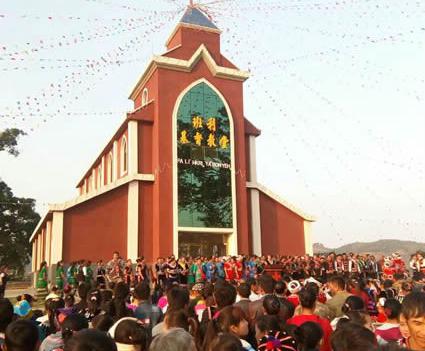The Banli Church, the central church for the Lahu ethnic minority Church in Lanchang County and the location of the Christian Training Center in the county, hosted a dedication ceremony on March 8. Almost 2,000 people from the surrounding churches attended the ceremony from the Lahu, Wa, Lisu, Miao, Hani, and Han peoples, as well as fellow workers of the church and other believers.
According to an article on the official website of the national CCC&TSPM, Preacher Li Zha'er, Deputy General Secretary of the TSPM Committee of Lanchang County, presided over the ceremony. Pastor Tian Yanping, Deputy Chairman of the provincial TSPM and chairman of the TSPM of Pu'er City, encouraged the brothers and sisters of the church to follow the Bible's teachings and be the salt and light to the world to glorify God's name. Pastor Duan Sanmei, Director of Banli Christian Church, narrated the conditions when they started building the church. Pastor Cai Kaixiang, president of the Christian Council of Shuangjiang County, preached a sermon in Mandarin entitled "Be Holy in the Lord" which was translated by Pastor Li Dexue, chairman and president of the CCC&TSPM of Linchang City, into the Lahu dialect.
Located in the southwest of Yunnan Province, Lanchang County is named after the river on its east, in which Nuofu County and Banli Village in Donghui Township have the most Christian population. According to the "Christian Music Survey of Banli Village, Donghui Town, Lanchang County, Pu'er City, Yunnan," there are Lahu, Wan, and Hani minorities in Banli, with Lahu comprising 79.4% of the population. There are 5 legally registered religious venues, 203 households with over 1,000 believers, and around 10 clerical personnel in the village. Christians account to 34% of the total population in the village, and are mostly Lahu and Wa. Lahu believers use a Bible in the local dialect published by Amity Printing Co. Ltd. Their hymn book is a 2007 version in the same dialect with 585 hymns using numbered musical notation. Some of the songs were written recently, while some have been passed down. They usually sing acappella in four parts or accompanied by a keyboard, and hymns and short songs are accompanied by either a keyboard or guitar.
Translated by: Grace Hubl












